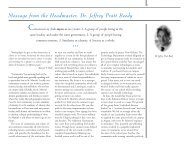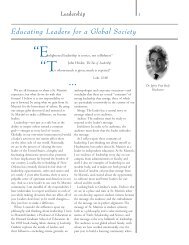the Bell - St. Martin's Episcopal School
the Bell - St. Martin's Episcopal School
the Bell - St. Martin's Episcopal School
Create successful ePaper yourself
Turn your PDF publications into a flip-book with our unique Google optimized e-Paper software.
6<br />
In support of<br />
Problem Based Learning<br />
What has been will be again,<br />
what has been done will be done again;<br />
<strong>the</strong>re is nothing new under <strong>the</strong> sun.<br />
(Ecclesiastes 1:9).<br />
Surely even <strong>the</strong> Greeks knew that <strong>the</strong>ir educational <strong>the</strong>ories<br />
and styles were already ancient when <strong>the</strong>y first employed <strong>the</strong>m.<br />
The small forum on an A<strong>the</strong>nian hilltop with Socrates eternally<br />
asking questions was almost certainly only a very early recorded<br />
example of what had passed for education in <strong>the</strong> even more<br />
ancient societies. So it is nothing new to discuss problem based<br />
learning. It has been with us from antiquity, but it is certainly<br />
experiencing a much needed revival within <strong>the</strong> broad frame of<br />
educational philosophies.<br />
For me, problem based education occurs within <strong>the</strong> context<br />
of medical education, but it is practical, relevant, and applicable<br />
in most fields of educational activity. Specifically, many medical<br />
institutions are introducing first year medical students to problem<br />
based learning to assure a prompt integration of even early and<br />
rudimentary medical learning into <strong>the</strong> whole process of assembling<br />
and analyzing data, proposing diagnoses, testing and treatment.<br />
When one meets with a group of freshman medical students<br />
to undertake this task, <strong>the</strong> daunting problems of problem based<br />
learning are immediately apparent. It is slow, very time consuming,<br />
teacher or instructor intensive, and <strong>the</strong>refore a ra<strong>the</strong>r costly<br />
form of education. However, <strong>the</strong> great advantages are equally<br />
apparent: learning builds on previous learning and experience;<br />
inference, reasoning, judgment are heavily used, emphasized<br />
and rewarded when <strong>the</strong>y lead to correct decisions and solutions;<br />
common sense is highly valued; research to assure that inference<br />
and reasoning are based on facts if known is de riguer; and <strong>the</strong><br />
learner achieves a great sense of accomplishment in knowing<br />
that he has taken a major role in his own educational process.<br />
An example: <strong>the</strong> student is only in <strong>the</strong> first quarter of medical<br />
training, but a first unit of problem based learning presents a<br />
young male with pallor, tachypnea, lethargy, and tachycardia.<br />
First, does <strong>the</strong> student already know <strong>the</strong>se terms (<strong>the</strong> patient is<br />
white, short of breath, tires easily, and has a rapid heart rate)? If<br />
not we are building medical vocabulary. Surely even a rudimentary<br />
knowledge of <strong>the</strong> human condition would suggest anemia<br />
to most. Now we are off: why is he anemic, how would we prove<br />
it, what might cause it, how do we treat it? Those are <strong>the</strong> questions<br />
<strong>the</strong> students must answer to solve <strong>the</strong> problem. The answer<br />
should be sought individually, toge<strong>the</strong>r within <strong>the</strong> group, through<br />
research, study, or even recourse to perhaps older and wiser<br />
minds.<br />
Problem based learning cannot be used as an exclusive tool,<br />
but it is powerful when used adjunctively. Let me close with an<br />
anecdote based on <strong>the</strong> protocol above. In <strong>the</strong> actual description<br />
introducing our “anemic” patient, he was described as pallid.<br />
Some of <strong>the</strong> first year students were a little unsure of <strong>the</strong> meaning.<br />
To reinforce <strong>the</strong> learning point, I directed <strong>the</strong> students to an<br />
entirely different field of study and asked all to find within one<br />
week a line of poetry “Perched upon a pallid bust of Pallas”.<br />
When <strong>the</strong> week had passed, <strong>the</strong> group spokesman informed<br />
me that <strong>the</strong> obvious use of alliteration had lead <strong>the</strong>m immediately<br />
to <strong>the</strong> works of Edgar Allan Poe, enabling <strong>the</strong>m to correctly<br />
identify this as a line from The Raven. I was greatly gratified with<br />
<strong>the</strong>ir correctness and <strong>the</strong> deductive reasoning that had lead to<br />
<strong>the</strong> solution. However, as <strong>the</strong> hour ended <strong>the</strong> same young student<br />
sheepishly admitted that Google had actually supplied <strong>the</strong> answer<br />
within seconds. But <strong>the</strong> great revelation of this problem solving<br />
was that one can drop one word successively from that line,<br />
reserving only <strong>the</strong> word pallid to <strong>the</strong> last, and Google will continue<br />
to correctly suggest that you are seeking a line of poetry from<br />
Poe’s poem, The Raven.<br />
The lesson(s): Problem based learning works; not one of<br />
those students will ever equivocate about <strong>the</strong> meaning of pallid<br />
again. They found <strong>the</strong> answer, <strong>the</strong>y learned <strong>the</strong> lesson, and <strong>the</strong>y<br />
solved <strong>the</strong> problem using <strong>the</strong> ever more powerful research tools<br />
of <strong>the</strong> modern world. And it is obvious <strong>the</strong> teacher was taught,<br />
too.<br />
Robert M. Arensman, M.D.<br />
Chicago, Illinois, November 2009<br />
Member of <strong>St</strong>. Martin’s Board of Visitors and Parent of Alumni




